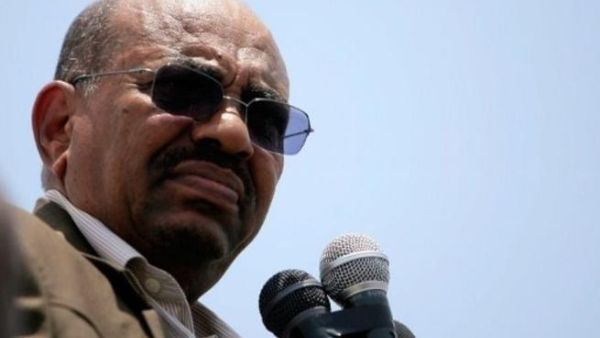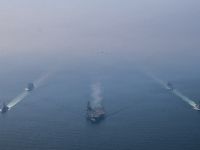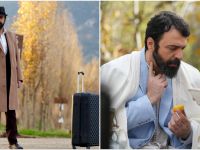Sudan’s President Omar al-Bashir Wednesday dismissed calls for an Arab Spring-style popular uprising in the African country, as his opponents claimed Sudanese security forces had begun using live ammunition against protesters.
“They talk of an Arab Spring, let me tell them that in Sudan we have a hot summer, a burning hot summer that burns its enemies,” Bashir said in a live address while inaugurating a sugar factory in central Sudan.
Sudanese university students armed with sticks and stones Wednesday staged perhaps their largest protest since unrest sparked by inflation began nearly a month ago, a witness said.
Security forces fired tear gas, the witness said, adding that the students at the University of Khartoum were shouting and throwing stones after the protest began mid-afternoon.
“Compared to other demonstrations it’s ... bigger,” said the witness who asked not to be identified.
With protesters scattered around the central campus, it was hard to determine their numbers, the witness said. “I think it’s more than 100,” he added. The university is where an unprecedented three weeks of national protests began on June 16, when students first voiced opposition to high food prices.
After Bashir announced austerity measures, including tax hikes and an end to cheap fuel, the scattered demonstrations spread to include a cross-section of people around the capital and in other parts of Sudan. Protesters are also calling for an end to Bashir’s 23-year regime.
A university source said the student demonstrators were now fighting for something else as well.
“A large number of their colleagues are now under arrest,” the source said. “I think this is the whole issue now,” as exams approach and detained students could lose their academic year, the source said.
The latest protests came as an opposition figure alleged Sudanese security forces were using live ammunition and increasingly aggressive tactics against anti-government protesters.
Mariam al-Mahdi, the daughter of former Prime Minister Sadiq al-Mahdi, said the Wad Nubawi Mosque, linked to her Umma Party, has been the scene of worsening attacks by government forces against peaceful protesters gathering on Fridays.
“Each time, the brutality, the aggressiveness, has been ... increasing,” said Mahdi, a policy maker in the party led by her father, speaking in an interview with AFP.
Authorities began to use gas and rubber bullets on June 22 when small demonstrations broke out after Friday prayers at the mosque, and elsewhere in the city.
“It was like a battle, like a military battle,” she said, adding that things got worse the following week. “People were besieged inside the mosque,” as police and agents of the National Intelligence and Security Service attacked “at the time of prayers,” said Mahdi, who witnessed the events.
While trying to seize people from inside the mosque they fired tear gas directly at the protesters, breaking the limbs of two people, she claimed. The protesters were able to set up a first-aid area for those affected by gas or struck by rubber bullets.
“They used live ammunition,” firing in the air in an effort to disperse people, but a security agent deliberately wounded one person in the leg, she alleged.
In late June police said they were responding “with a minimum use of force” against the demonstrators, whom the government calls “rioters” posing a threat to Sudan’s stability.
Bashir has played down the demonstrations as small-scale and incomparable to the Arab Spring uprisings, maintaining popularity after 23-years of rule.
But two human rights groups, Amnesty International and Human Rights Watch, Wednesday said in a joint statement that security forces “have repeatedly used excessive force” against demonstrators and “arrested scores of peaceful protesters.”
It was not immediately clear how many people were detained in the latest university protest but a Sudanese rights group has claimed more than 2,000 have been held since the protests began.
The figure of 2,000 is difficult to confirm but reports indicate that at least 100 people are still detained in the Khartoum area. Activists, journalists, lawyers, doctors and members of youth groups and opposition parties not directly connected to the protests have also separately been detained, the joint statement from Amnesty and HRW added.
While many detainees have been released after hours or days, others “face lengthy interrogations in which they are accused of being traitors, communists, or spies; several have reported harsh treatment, including beatings and sleep-deprivation,” the watchdogs said.
Mahdi said she did not know what will happen at the Wad Nubawi Mosque this Friday but the government’s attitude is hardening.
“They have been saying in the media, [on] the radio, they will not allow any mosques to be used for ... foreign conspiracies and they will close any mosque which allows itself to be a forum for such activities,” she said, adding that the regime’s tactics will fail. “It’s sad because nothing of what they are doing will stop this.”
What do you think? Is this the Arab Spring in Sudan? Tell us your thoughts below.








